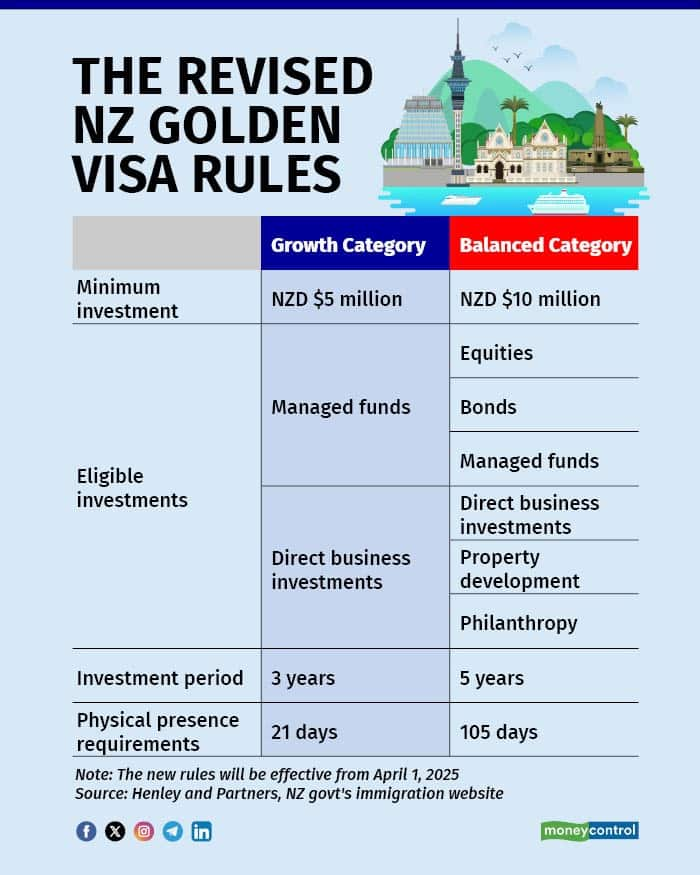



At a time when several countries, including the United Kingdom (UK), Portugal and Greece, are raising barriers for foreigners looking to obtain "golden visas" — second residency or residency rights by investments — New Zealand has relaxed its rules.
The new norms for securing the "Active Investor Plus Visa" come into effect from April 1. New Zealand has simplified the investment criteria, moving away from complex, multi-tiered matrix. It has also done away with the English proficiency requirement.
Simplified investor visa rules
The island nation has introduced two categories — growth and balanced — to facilitate investments. Under the growth option, investors will have to invest at least NZ$5 million (close to Rs 25 crore) for three years in “high-risk” options. These include managed funds and direct business investments. They have to spend minimum 21 days in the country over the investment period.

The minimum investment needed under the relatively less-risky balanced option — in listed equities, bonds (government, local government and corporate) and philanthropy — is NZD $10 million (approximately Rs 50 crore) for five years. During this period, they have to spend at least 105 days in the country, though the requirement can be relaxed depending on the investment amount and type.
“The government has now added bonds and property development as permitted investment avenues to the balanced category,” said Rohit Bhardwaj, Country Head India, Henley and Partners.
The new measures have been announced to bring in more foreign investments in light of contraction in economic growth and fewer people opting for visas under investor or entrepreneurship categories.

Also read: More Indian migrants turn to New Zealand after pandemic, investment route finds favour
At present, the minimum investment parameter — ranging from NZD $5 million to 15 million — is also linked to the type of investments wealthy migrants make and the weightage they carry.
“Acceptable investments carry different weightings toward the NZD $15 million investment threshold. You can invest in a combination of these. Direct investments into a private business will receive the highest weighting (3x). This means that you could meet the required investment amount by investing NZD $5 million into direct investment,” the NZ immigration website says.
Another option for well-to-do Indians?
Golden visas provide wealthy individuals the opportunity to effectively buy residency rights by purchasing a house or making a large investment or donation in another country.
For Indians, the United States remains the most-sought-after destination, with investment migration consultants witnessing a sharp spike in demand for EB-5 Immigrant Investor Program visa after President Donald Trump’s move to disallow citizenship by birth. The decision has been temporarily blocked by courts.
While not the most popular destination, data shows that the share of Indians in total accepted applications for residency in New Zealand has gone up after the COVID-19 pandemic.
According to a Moneycontrol analysis, the number of Indian investors taking this route is minuscule but the numbers are rising when compared to overall applications. Around 17 percent of total accepted residence applicants in New Zealand were Indians until 2019, a share that rose to 24.8 percent in 2022, and 28.2 percent in 2024.
“Starting April 1, the Active Investor Plus complex weighting system will be replaced with two simplified investment categories. New Zealand is one of the desired commonwealth nations for Indian families to send their children for international education and for many Indian HNWI families, this positive change is expected to boost an interest in the Active Investor Plus visa,” said Bhardwaj.

Also read: Golden visa via real estate investment: Why Indians are preferring these global destinations
Many affluent Indians often aspire to relocate, particularly to geographies that are part of the commonwealth, English-speaking regions.
“One of the goals is international education for kids. With some countries clamping down on employment opportunities for international students, it might make sense for wealthy Indians to obtain residency by investment and facilitate their children’s education and security in those destinations,” Bhardwaj said.
The changes in will make it easier for high-net worth individuals, including Indians, to gain residency through investment, said Karan Agarwal, director, Cox & Kings.
“The move signals New Zealand’s intent to attract more global capital and encourage long-term economic contributions. While visa rejection rates for tourists remain steady, these policy shifts open up new opportunities for investors seeking to establish a foothold in the country,” he said.

The challenges
The minimum investment threshold — NZD $5 million —remains a steep barrier. “For domiciled Indians, the capital controls in place in India (RBI’s Liberalised Remittance Scheme ceiling of $2,50,000 per financial year) could be a hurdle when it comes to meeting the minimum investment requirements for the NZ golden visa. However, global Indians with investments across the world may not find it challenging to meet the requirements,” said an immigration consultant who did not wish to be named.
The minimum investment requirement for the US EB-5 Visa is $800,000, which a family of four can manage in a financial year, which may not be the case with NZ's golden visa.
“Even if a family of, say, four members, were to spread out the investments across financial years, they might fall short (of NZ investor visa requirements) as the requirements over multiple years for the visa may not cover the minimum amount needed. Only families who have planned to move out of the country over a period of time and have been creating assets accordingly could find this feasible. If someone is going to start now, then it will be an immediate challenge,” said Vishal Dhawan, founder, Plan Ahead Wealth Advisors.
Discover the latest Business News, Sensex, and Nifty updates. Obtain Personal Finance insights, tax queries, and expert opinions on Moneycontrol or download the Moneycontrol App to stay updated!
Find the best of Al News in one place, specially curated for you every weekend.
Stay on top of the latest tech trends and biggest startup news.